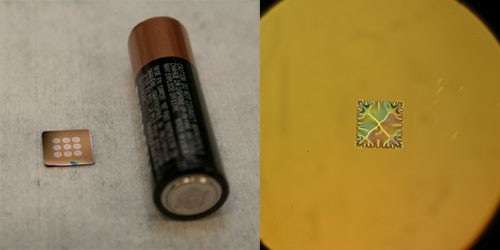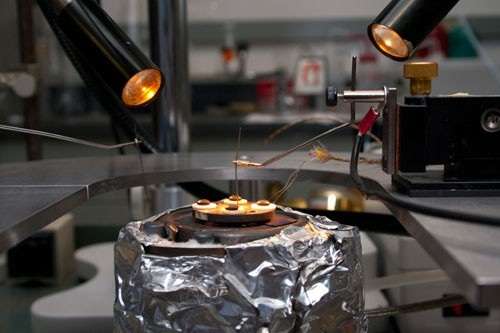July 11, 2012 feature
Hydrogen fuel cells provide power when fuel supply is off

(Phys.org) -- Fuel cells, which generate electricity from the chemical energy of a fuel such as hydrogen, are not intrinsically capable of storing energy. When a fuel cell’s hydrogen supply runs out or is temporarily interrupted, the cell’s power output quickly decreases to zero. If an application requires energy storage, then the fuel cell must be coupled to an external charge storage device, such as a battery, which increases the weight and volume of the system. But now researchers have designed a hydrogen fuel cell with a new anode that can supply electricity up to 14 times longer than conventional fuel cells, which could be particularly useful for mobile energy applications.
The researchers, Quentin Van Overmeere, Kian Kerman, and Shriram Ramanathan, at the Harvard School of Engineering and Applied Sciences in Cambridge, Massachusetts, have published their study on the energy-storing solid-oxide fuel cells (SOFCs) in a recent issue of Nano Letters.
In their study, the researchers fabricated the solid-oxide fuel cell’s anode with either vanadium oxide or a combination of vanadium oxide and porous platinum. Vanadium is known for its tendency to change oxidation state, a process that involves the transfer of electrons. Since a key to enabling fuel cells to store charge is to use materials that can reversibly transfer electric charges, vanadium’s properties make it a good candidate for these technologies.
"This thin-film SOFC takes advantage of recent advances in low-temperature operation to incorporate a new and more versatile material," said Ramanathan. "Vanadium oxide at the anode behaves as a multifunctional material, allowing the fuel cell to both generate and store energy."
The researchers’ experiments showed that, after the hydrogen fuel supply is turned off, fuel cells with the vanadium oxide anode could generate power for more than 3 minutes, compared with about 10-15 seconds for fuel cells with porous platinum anodes. Both fuel cells produced a comparable amount of power, and the researchers expect that future improvements will further extend this time. With the ability to store electrochemical energy, the new device could be thought of as combining the characteristics of a fuel cell and a battery.

For now, the researchers do not know exactly what allows the new fuel cell to run after its supply is cut off. They identified and tested three possible charge storage mechanisms, with the results showing that reversible oxidation of the anode contributed a portion of the observed charge, but did not account for all of it. The finding suggests that the power generation in the absence of fuel arises from multiple mechanisms.
Although identifying the underlying mechanisms will require further research, the discovery that vanadium oxide anodes can store energy and deliver power when the fuel supply is depleted could be useful for developing future miniature power sources. Applications could include miniature autonomous systems, military technologies, and other devices that need to operate for short time periods.
"Unmanned aerial vehicles, for instance, would really benefit from this," said Van Overmeere. "When it's impossible to refuel in the field, an extra boost of stored energy could extend the device's lifespan significantly."
More information: Quentin Van Overmeere, Kian Kerman, and Shriram Ramanathan. “Energy Storage in Ultrathin Solid Oxide Fuel Cells.” Nano Letters. DOI: 10.1021/nl301601y
Journal information: Nano Letters
Copyright 2012 Phys.org
All rights reserved. This material may not be published, broadcast, rewritten or redistributed in whole or part without the express written permission of PhysOrg.com.




















